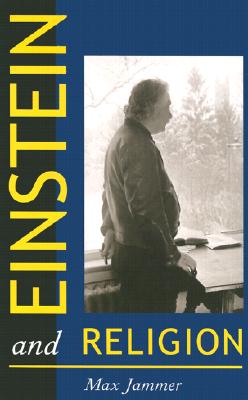Einstein and Religion: Physics and Theology

Einstein and Religion: Physics and Theology
The philosophy of religion and the quest for spiritual truth preoccupied Albert Einstein--so much that it has been said "one might suspect he was a disguised theologian." Nevertheless, the literature on the life and work of Einstein, extensive as it is, does not provide an adequate account of his religious conception and sentiments. Only fragmentarily known, Einstein's ideas about religion have been often distorted both by atheists and by religious groups eager to claim him as one of their own. But what exactly was Einstein's religious credo? In this fascinating book, the distinguished physicist and philosopher Max Jammer offers an unbiased and well-documented answer to this question.
The book begins with a discussion of Einstein's childhood religious education and the religious atmosphere--or its absence--among his family and friends. It then reconstructs, step by step, the intellectual development that led Einstein to the conceptions of a cosmic religion and an impersonal God, akin to "the God of Spinoza." Jammer explores Einstein's writings and lectures on religion and its role in society, and how far they have been accepted by the general public and by professional theologians like Paul Tillich or Frederick Ferré. He also analyzes the precise meaning of Einstein's famous dictum "Science without religion is lame, religion without science is blind," and why this statement can serve as an epitome of Einstein's philosophy of religion. The last chapter deals with the controversial question of whether Einstein's scientific work, and in particular his theory of relativity, has theologically significant implications, a problem important for those who are interested in the relation between science and religion. Both thought-provoking and engaging, this book aims to introduce readers, without proselytizing, to Einstein's religion.PRP: 372.00 Lei
Acesta este Prețul Recomandat de Producător. Prețul de vânzare al produsului este afișat mai jos.
334.80Lei
334.80Lei
372.00 LeiLivrare in 2-4 saptamani
Descrierea produsului
The philosophy of religion and the quest for spiritual truth preoccupied Albert Einstein--so much that it has been said "one might suspect he was a disguised theologian." Nevertheless, the literature on the life and work of Einstein, extensive as it is, does not provide an adequate account of his religious conception and sentiments. Only fragmentarily known, Einstein's ideas about religion have been often distorted both by atheists and by religious groups eager to claim him as one of their own. But what exactly was Einstein's religious credo? In this fascinating book, the distinguished physicist and philosopher Max Jammer offers an unbiased and well-documented answer to this question.
The book begins with a discussion of Einstein's childhood religious education and the religious atmosphere--or its absence--among his family and friends. It then reconstructs, step by step, the intellectual development that led Einstein to the conceptions of a cosmic religion and an impersonal God, akin to "the God of Spinoza." Jammer explores Einstein's writings and lectures on religion and its role in society, and how far they have been accepted by the general public and by professional theologians like Paul Tillich or Frederick Ferré. He also analyzes the precise meaning of Einstein's famous dictum "Science without religion is lame, religion without science is blind," and why this statement can serve as an epitome of Einstein's philosophy of religion. The last chapter deals with the controversial question of whether Einstein's scientific work, and in particular his theory of relativity, has theologically significant implications, a problem important for those who are interested in the relation between science and religion. Both thought-provoking and engaging, this book aims to introduce readers, without proselytizing, to Einstein's religion.Detaliile produsului









